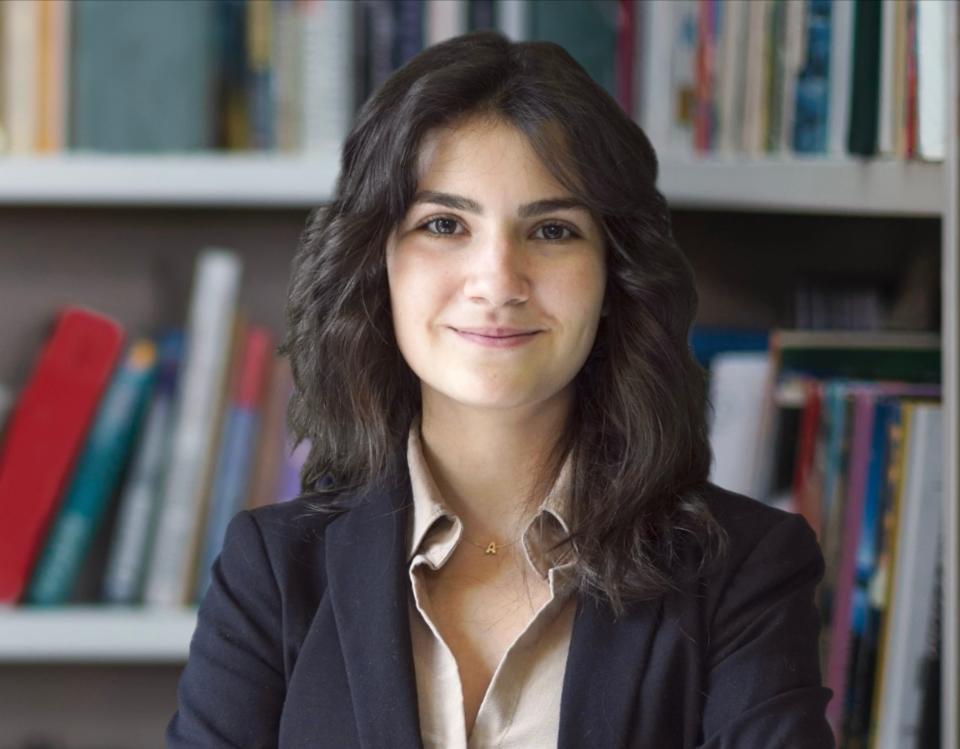Abortion rights helped lower teen pregnancy. Now Gen Z girls might have those rights taken away.
For every teenage girl in the United States, Roe v. Wade has always been the law of the land. But they might be soon entering adulthood in a nation where abortion rights would be decided state by state.
Born between 1997 and 2012, Gen Z children have benefited from a political era where Roe v. Wade has been linked with helping to reduce teenage pregnancy, along with improved access to contraception and sex education. Gen Z girls are also having less sex than their predecessors but many are still sexually active.
The Centers for Disease Control and Prevention reports over half of teens will have had sex by the time they become adults. With that comes the risk of unplanned pregnancies and sometimes tough decisions, including whether to seek an abortion.
The Supreme Court is expected to issue its ruling soon on whether it will uphold or strike down Roe v. Wade, the case that made abortion legal in 1973. A draft opinion leaked in early May indicated the court will overturn the ruling and allow states to decide on abortion laws.
USA TODAY spoke with Gen Z teens in Florida and Oklahoma – two states with some of the nation's strictest abortion laws in the works – about their concerns over how changing abortion laws could impact their own and their friends’ lives.
This is what they had to say.

Text with the USA TODAY newsroom about the day’s biggest stories. Sign up for our subscriber-only texting experience.
Reproductive rights a top concern for some
Ella Turner, 17, and her mom have been touring colleges all year, most of them in the South.
She said there's always a moment in the tour where one of the parents of another girl will pipe up and ask: "What kind of blue light features does the school provide? Will school security escort my kid back to her dorm from the library?"
The risks of sexual assault on college campuses and the emotional and physiological consequences – including an unwanted pregnancy – are on many young women's minds.
For Ella, that's why access to reproductive health services that include everything from birth control to abortion are so important.
"Roe v. Wade protects a right to a part of healthcare that all women should have access to," Ella said. "Allowing women to have the choice doesn't mean everyone has to participate in getting an abortion."
Ella said abortion rights are a big topic of discussion in her Oklahoma high school, a state home to the country's strictest abortion law to date.HB 4327, waiting to be signed by Republican Gov. Kevin Stitt, would ban all abortions in Oklahoma after the moment of fertilization except in cases of life endangerment, incest or sexual assault. Oklahoma is also a state where sex education programs are primarily about abstinence.
"I've had plenty of friends on both sides of the political spectrum write papers about how that's impractical," Ella said.
She said her biggest fear over Roe v. Wade being overturned is the potential harm to people like her and her friends.
"It's causing more harm to girls specifically too, but just all teenagers," she said. "And just misinformation and not really being informed and stuff like that."

Pregnancy scares are common
It’s a quick 20-minute drive from school. From home, add an extra 15 minutes to the journey.
Sophia Duran, 18, knows the quickest way to get to her Miami neighborhood’s nearest Planned Parenthood — just in case.
“I'm always making sure that I know what steps I possibly could take,” Duran, who earns her high school diploma in two weeks, told USA TODAY.
She’s yet to have to enter the building herself. “I do know a handful of people who have had to do that,” the child of Colombian American immigrants shared.
Duran has visited several pharmacies in support of friends in the midst of pregnancy scares. “I always told my mom, ‘my friend is going through something, can we please go to the nearest drugstore and figure it out?’” Duran said.
When she walks in, she feels it. The judgmental stares. The tension as she hands the pregnancy tests to the cashier.
It’s never deterred her from helping a friend in need.
“I know I'm doing it for a good reason,” Duran said. “It's not even for me, so I can't even imagine the weird shame that is put upon you just to make sure that you're pregnant or not.”
Duran was sitting through four hours of her Advanced Placement government exam the day she learned about the Supreme Court's leaked opinion against Roe v. Wade.
“The second I got out of the exam, right after being tested on Roe v. Wade, the answer possibly changed,” she said. “That was one of the strangest feelings in the world, like, I was just writing about it, and only in possibly a year's time, that response could possibly be wrong.”

Helping a friend get an abortion
Kayla Cardenas, 18, saw the message from her friend: The teenage girl was pregnant.
Cardenas, a high school junior at the time, wanted to go over to her friend's house so they could speak about it face to face. But it was in the middle of the COVID-19 lockdown when they were still going to school online.
So she did the only thing she thought she could do to offer her friend support: Google.
"I immediately started researching and trying to help her figure out a solution," Cardenas said. "And because of that, we were able to find the clinic she would ultimately go to with her mom."
Cardenas couldn't accompany her friend to the abortion clinic, but when it was done, she sighed with relief.
"Once it was all said and done, I just felt happy for her because that's what she felt about herself," Cardenas recalled.
When Cardenas got on Twitter earlier this month and read that U.S. Supreme Court justices had signaled that they might overturn the landmark Roe v. Wade decision that gave people a constitutional right to an abortion, the first person she thought of was her friend.
And it could literally happen to anyone, she thought. She knew her friend's story wasn't unique.
With graduation only a few weeks away and Cardenas soon going off to college, the possible erosion of her abortion rights feels even scarier.
She and her friends were already terrified watching how her home state of Florida has cracked down on abortions. In April, Gov. Ron DeSantis signed into law a measure banning abortions after 15 weeks. The law's only exception is if the abortion is necessary to save a mother's life. It does not allow for exemptions in cases where pregnancies were caused by rape, incest or human trafficking.
"It does make me scared. I think immediately about a book that I had to read in 11th grade called 'The Handmaid's Tale,'" Cardenas said. "I honestly feel like if Roe v. Wade were to be overturned, it could get to that extreme."

'I'd definitely consider moving to Canada'
When some Americans don’t agree with the current political climate of home, it’s not uncommon to hear announced plans — hypothetical or not — to relocate to Canada.
The thought has crossed 17-year-old Amanda Rey’s mind. But for the college-bound Miami senior, a trip to Toronto would merely be returning home.
It’s where she grew up.
“Since 1988, abortion has been legal at any stage in a woman's pregnancy in Canada, and it's publicly funded as a medical procedure,” said Amanda, who intends to study public policy and political science at Duke University in North Carolina this fall. She’s lived in the United States for three years.
“It's definitely very different from the political landscape that we have here, because we have a state-funded healthcare system,” Amanda said.
The driven student’s plan has always been to study, for both her undergraduate and graduate degrees, at an American law school.
But when she heard about the changes possibly coming to abortion laws in the United States, she began researching the process of transferring a U.S.-based degree program to Canada.
“I just feel that we're foreshadowing something that's truly sinister,” she said.
“In ‘The Handmaid's Tale,’ there's a passage where Margaret Atwood is talking about how if you're in a bath and the water is slowly getting warmer and warmer, you don't necessarily feel it until it's too late, it's already boiling and the situation is past remedy,” she said.
“I would definitely consider moving to Canada, to a place in Europe or elsewhere where my value as a woman is intellectual as well, and they're not commodifying women.”

Choosing whether to be a mom
SCOTUS has yet to make an official decision on the future of Roe v. Wade. Still, politicians and lawmakers at the state level have already made moves to enact strict anti-abortion measures.
Kayla Crossen, a 17-year-old high school junior, fears Oklahoma will soon prohibit all abortions with very few exceptions.
“That is horrible, I very much do not like that,” said Kayla, of Edmond, Oklahoma, who strongly supports a woman’s right to choose.
“I find it really weird that they're just doing it now, after all, because we've had the ability to choose to get an abortion for so long,” she said.
Kayla said strict anti-abortion laws and the overturning of Roe v. Wade won’t halt abortions overall — they’ll just halt safe and legal procedures.
She said she and her circle of friends aren’t “very active” sexually. She's never had a pregnancy scare or to worry about whether to keep an unborn child.
But she knows her high school peers have had those concerns, and she says it should be their choice to do what they want when faced with those tough calls.
“I want them to be able to, like, have that choice,” Kayla said.

This article originally appeared on USA TODAY: Some Gen Z girls are worried about losing their abortion rights

 Yahoo Movies
Yahoo Movies 
